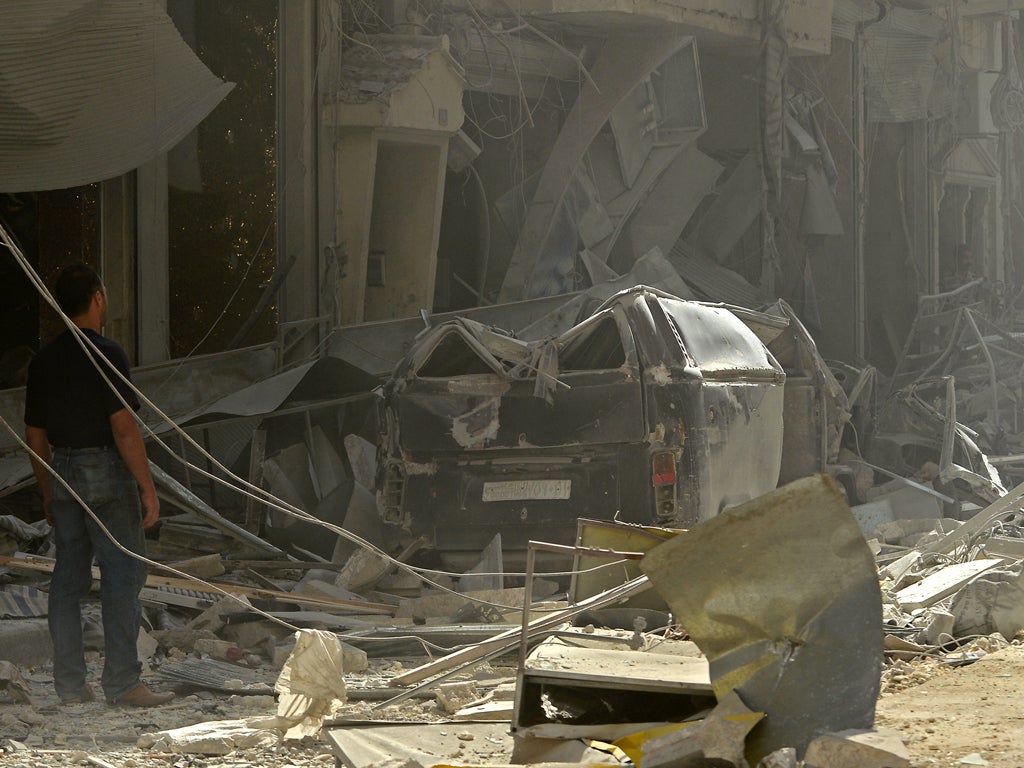Bloodshed in Syria, shuttle diplomacy, and why David Cameron should resurrect the Blair Doctrine
Proponents of Western intervention were vindicated by Libya. Now for Damascus

I was outside the Blue Mosque in Istanbul on Sunday, where activists displayed photos of beheaded Syrian children. Turkey is a key focal point in the escalating Syria crisis – which some have deemed a proxy war. Turkey no doubt has the ability to change events on the ground in Damascus, with its sizeable and capable military, and its political and international credibility as a leading Muslim nation. All eyes are on Ankara, for now.
Eyes in other centres of world power – Washington, London, Paris and Berlin, are turned firmly away from the bloody plight of Syria's people. The political classes in those capitals, ours included, prefer to be occupied with gossip about Britain's role in the European Union, the daily movements of Big Bird, and the Greek budget deficit. It feels at times like nobody is paying any attention to the children being brutally murdered – not for anything they've done, but simply by accident of being born on the wrong side of a fight between a free future and an oppressive past.
After Rwanda
When the Rwanda genocide happened in the 1990s, Western leaders were forthright in their apology for inaction. 'It would never happen again under our watch', they claimed. Well it is happening. Western leaders are turning a blind eye to the massacre that is underway up and down Syria. They're too busy with domestic politics and economics to spare any thought for the Syrians. I ask myself, while looking at the gruesome photos outside the Blue Mosque: what would Blair have done?
One of the greatest achievements of any Labour government was the creation of a doctrine for humanitarian international intervention. Tony Blair, along with Bill Clinton and later George Bush, succeeded in creating a precedent for intervention not just where British interests could be improved or protected, but by making the right of Sierra Leonians, Kosovar Albanians and Afghan women not to be murdered and tortured, one of our own interests.
Of course, this doctrine led to expensive prolonged wars in Afghanistan and Iraq, but I think history will look favourably on both wars, all said and done. The chattering classes in Britain can no longer use Iraq as an excuse not to act elsewhere. Intervention has succeeded in Libya, as it has in the past in other places. It's time to move on from Iraq and let the Blair doctrine work its course.
Prime Minister Cameron is famously a fan of Tony Blair – for a while he was touted as his heir; radical on public service reform, muscular in defence of Western values. The Libyan intervention, which he led, was a tremendous success. But if Cameron wants to inherit Blair's mantle on the world stage, and stand up for those incapable of standing up for themselves, he should consider activating the Blair doctrine on Syria now.
Learn from Blair
What would that mean exactly?
First, it needs to be said loud that action in Syria is going to happen in some form or another. Of course Russia will block Security Council resolutions authorising use of force in the Levant. However there are other options. There is a case to be made for the legitimacy of action in Syria, particularly under the Responsibility to Protect doctrine in international law. David Cameron should draw a line in the sand, and send the clear signal that he intends, with partners, to act.
Second, a dose of Blair-style shuttle diplomacy must begin now. David Cameron should be a regular visitor in Ankara, Washington DC, Paris, Moscow, Beijing, Amman, Riyadh and other capitals over the coming weeks. The aim should be to form a consensus over how action might look and which assets and authorisations might be already forthcoming, or close to being attained. The 'good offices' of Prime Minister of Great Britain can go a long way.
Third, the Security Council track should not be abandoned. Attempting to put through a resolution, either authorising war or condemning Assad and his supporters in the strongest terms, will highlight the cause worldwide, and begin a debate on how intervention might happen. William Hague should set up shop in New York forthwith.
Fourth, options already open to us should be used more fully. This will include ramping up the supply of weapons, strategic support and training to rebels, in the hope that Assad's regime might be toppled. I don't see why it can't be possible for Assad himself to be removed from the theatre, perhaps by assassination, or perhaps by using the French modus operandi in the Ivory Coast – work with rebels and Special Forces to arrest him.
Of course, I have the luxury of publishing these thoughts without any consideration for the 'realpolitik' of the situation, or the ability or inability for Britain and Western partners to act. But for too long, in too many situations, 'realpolitik' has been used an excuse not to act. It's time to forget about an EU referendum for a while, and about Big Bird, and get serous about ending the atrocities that are happening hour-by-hour in Syria.
Britain, American and France have the tools to stop the bloodshed; allowing it to continue any further would result in blood on all of our hands.
Join our commenting forum
Join thought-provoking conversations, follow other Independent readers and see their replies
Comments
Bookmark popover
Removed from bookmarks